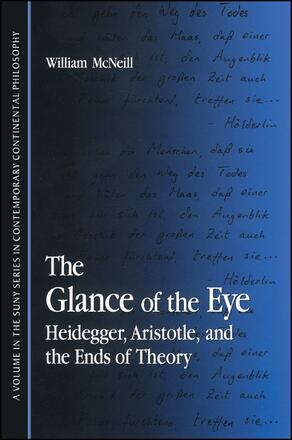
The Glance of the Eye
Heidegger, Aristotle, and the Ends of Theory
Alternative formats available from:
Argues that Heidegger's early reading of Aristotle provides him with a critical resource for addressing the problematic domination of theoretical knowledge in Western civilization.
Description
William McNeill explores the phenomenon of the Augenblick, or "glance of the eye," in Heidegger's thought, and in particular its relation to the primacy of seeing and of theoretical apprehending (theoria) both in Aristotle and in the philosophical and scientific tradition of Western thought. McNeill argues that Heidegger's early reading of Aristotle, which identifies the experience of the Augenblick at the heart of ethical and practical knowledge (phronesis), proves to be a decisive encounter for Heidegger's subsequent understanding and critique of the history of philosophy, science, and technology. It provides him with a critical resource for addressing the problematic domination of theoretical knowledge in Western civilization. Such knowledge, the author shows, always remains in a peculiar tension (itself historically determined and changing) with ethical or "protoethical" knowledge, which is bound to the finite, "ecstatic" temporality of the lived and living moment, and inevitably exposed to the presence of the sensuous.
William McNeill is Associate Professor of Philosophy at DePaul University.
Reviews
"What is truly remarkable in McNeill's work is the blend of impeccable scholarship and of a certain speculative audacity. The meditation on the figure of vision by reference both to the Western theoretico-philosophical heritage and to the question of temporality is a most compelling course of inquiry. With consummate skill, McNeill illuminates Heidegger's oeuvre, from his early encounter with the Greeks (Aristotle in particular), to his reading of Nietzsche, to his concern with the reduction of theorein to the horizon of technology, to 'The Origin of the Work of Art' and later writings. This is an important, long awaited work; one which situates itself in the context of the broader debates in contemporary continental philosophy concerning the issues of vision, visibility, illumination—concerning the primacy traditionally accorded to the order of the visual, the denial of the limits pertaining to it, and the disaster accompanying such privilege and such denial." — Claudia Baracchi, University of Oregon